
La Liga to sponsor Welsh side with world's longest name
La Liga unveil a partnership with Welsh side CPD Llanfairpwll FC, who boast the longest name in world football.
2023-09-16 00:56
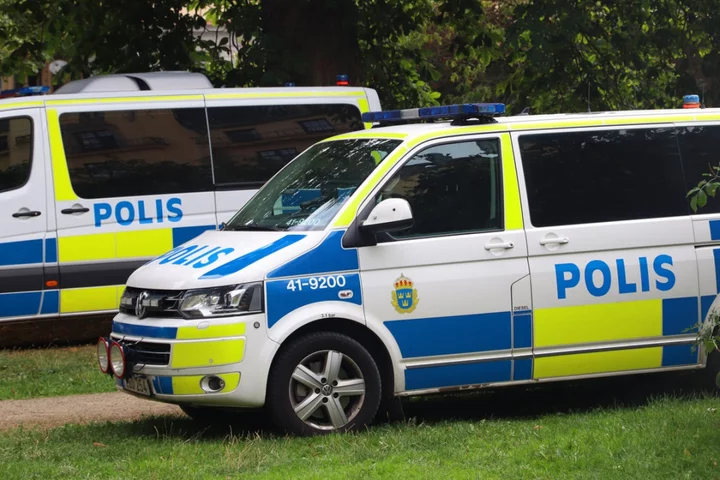
Teenager is latest victim of spate of deadly shootings across Sweden
A teenager has died after being shot in the southern suburbs of Stockholm – one of a spate of shootings in the country across the last week. Police received were called after loud bangs were heard in Vastertorp at around 8pm local time on Thursday, with the injured boy – whose age was not given – taken to hospital before dying of his wounds overnight. The other shootings include four in the university city of Uppsala – two of them fatal – and two others in Stockholm, where a 13-year-old teenager lost his life. Stockholm police said they were still seeking a suspect. “I don't have a clear answer as to whether this is connected to other murders recently, but it is something we are investigating,” said spokesman Towe Hagg. Sweden has faced an increase in recent years which police and authorities blame on criminal gangs fighting over arms and drug trafficking, using guns and explosive devices.. Earlier this week, the national police chief, Anders Thornberg told a press conference, that this wave of violence had reached an "unprecedented" level. “There have recently been after on an unprecedented scale,” Mr Thornberg said. “Several boys aged between 13 and 15 have been killed, the mother of a criminal was executed at home, and a young man in Uppsala was shot dead on his way to work,” he added. “Citizens are afraid, insecurity is increasing. And this at a time when we have raised our terrorist alert level in the country,” Mr Thornberg said. A number of crimes by gangs had been foiled in recent days, the police chief added, saying that such preventative work was key. “Several people have been arrested and weapons confiscated in Uppsala alone, where the situation is very serious,” Ulf Johansson, a police officer in the region, about 40 miles (65km) north of Stockholm. Up until the end of August this year – so not including the recent spate of incidents – there were 247 shootings across Sweden, according to national statistics. Those led to 30 deaths. Seventy-six of those incidents occurred around the region of Stockholm. In 2022, 62 people were killed in 391 shootings across the country, with 128 of those incidents around the Stockholm region. When announcing those statistics in December, the justice minister, Gunnar Strommer, called it a modern-day record. "Deadly gun violence has increased and unfortunately has hit a new, bloody record this year," he said. Mr Strommer said at the time that those 62 deaths compared to four in Norway, four in Denmark and two in Finland. In 2021, 45 people were shot dead in Sweden. In 2012, the total was 17 Also last year, there were 90 explosions and 101 attempted explosive attacks were recorded, according to the data. So far this year, more than 100 explosions have already been recorded. Sweden has gone from having one of the lowest incidences of gang violence to one of the highest over the last 20 years, according to the Swedish National Council for Crime Prevention, with the current government vowing to crackdown on gang crime. Read More Nobel Foundation raises the amount for this year’s Nobel Prize awards to 11 million kronor Things to know about Sweden's monarchy as King Carl XVI celebrates 50 years on the throne Sweden's figurehead king celebrates 50 years on the throne On the brink of joining NATO, Sweden seeks to boost its defense spending by 28% Sweden brings more books and handwriting practice back to its tech-heavy schools Trial starts in Sweden of 2 oil executives accused of complicity in war crimes in Sudan
2023-09-15 22:48
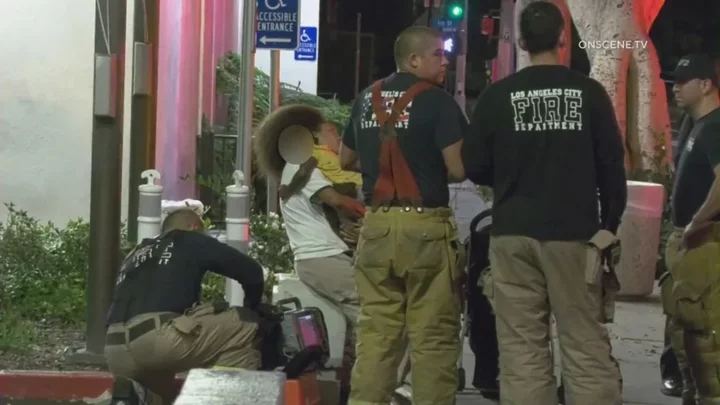
Mother arrested for abandoning toddler in stroller on side of LA street
A mother has been arrested after allegedly abandoning her young child on the side of a California street. Early Tuesday morning — in the middle of the night at 2.50am — a person walking in Larchmont Village in Central Los Angeles found a 3-year-old girl alone inside a stroller. The youngster, found on the 100 block of North Larchmont Boulevard, was taken to hospital to be examined. She was found to be in good health. The police searched the stroller and found an identification card belonging to Targie Alexandre, 24. After this, police were able to locate the father of the child, but Ms Alexandre’s location was unknown. "We’ve had a lot of resources devoted to this over the past day, from officers, detectives, we’ve had our bloodhounds out there," said Lt. Brian Churchill of the Los Angeles Police Department. "We’ve had no luck finding the mother so we’re asking for the public’s help right now." However, Ms Alexandre was arrested on Wednesday night after police were waiting for her at her workplace, police said. She has been charged with a felony of child endangerment and is being held on $105,000 bail. The felony punishment for child endangerment is up to six years in state prison and a fine of up to $10,000. Earlier this year, a Georgia woman was arrested for the 2019 abandonment of her newborn baby after it was found alive in a plastic bag. The mother, Karima Jiwani, was charged with criminal intent to commit murder, cruelty to children in the first degree, aggravated assault and reckless abandonment. Read More Mother of ‘Baby India’, left to die in a plastic bag in Georgia woods four years ago, is finally arrested Man sentenced for abandoning baby after MLB pitcher Dennis Eckersley's daughter gave birth in woods Family suspect murder after getting alerts from dead LA woman’s Apple products
2023-09-15 22:45
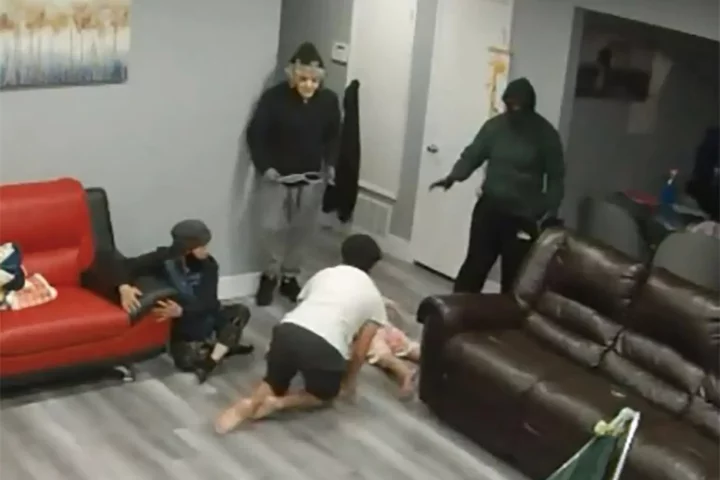
Terrifying images show masked home invaders holding family at gunpoint
A family, including two children and an elderly woman, endured a terrifying ordeal when they were held at gunpoint by masked burglars. The beyond-scary home invasion happened on Monday in Orange County, California, at around 10.40pm when the disguised intruders entered the family’s home on a quiet residential street. When the invaders entered the home, one of the masked men used a stun gun on an adult male in the family, forcing him onto the ground, the City of Westminster Police said in a statement. The man, an elderly woman and two children — a 14-year-old boy and a 7-year-old girl — were all tied up in the living room. The suspects then demanded to know where they kept their valuables. In one alarming photo released by police, two robbers in masks can be seen gesturing for the family to get on the floor. The 7-year-old is pictured flat out by the suspect’s feet. The burglars then ransacked their property looking for anything of value, the New York Post reported A fifth victim, an adult female, was able to hide inside a closet while the home invasion was taking place. She called 911 and whispered down the phone that she needed help. As the officers arrived within three minutes, they saw four burglars sprint from the front door of the residence. One of the suspects, identified by police as Danny Sommay, was caught outside after he threw his handgun over a brick wall. The police recovered the firearm and found it to be a loaded 9mm pistol that had been reported as stolen. The Huntingdon Beach Police Department dispatched a helicopter to try and locate the missing three suspects, but were unable to locate them. Authorities did not say whether any of the victims needed medical attention or if the man hit with the stun gun was injured. Mr Sommay has been booked into Orange County Jail on charges of kidnapping, robbery, burglary, conspiracy to commit a felony, possession of a loaded and stolen firearm and armed criminal action on a $1 million bail. Read More Woman agrees to plead guilty to murder of college student who stopped to help her near off-the-grid encampment Man killed for asking robbers to return his ‘blinging’ gold chains, court told California lawmakers sign off on ballot measure to reform mental health care system
2023-09-15 21:58

Spain's World Cup-winning squad refuses to play upcoming matches amid fallout from unwanted kiss
Spain's World Cup-winning squad says it will refuse to be called up for the country's two upcoming Women's Nations League matches as it continues to push for "real structural changes" in Spanish soccer, following the fallout from ex-soccer boss Luis Rubiales' unwanted kiss on La Roja star Jennifer Hermoso.
2023-09-15 21:56
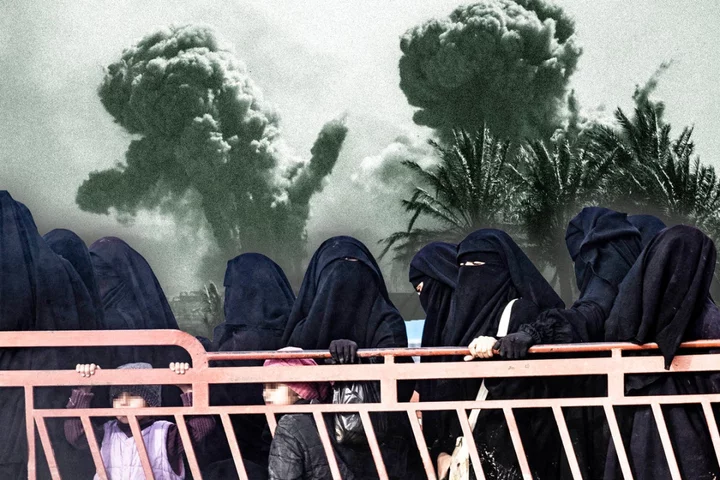
She was forced to live under Isis in Syria as a child and then stuck in a refugee camp. Finally she is home
In a courtyard in the shadow of Tirana’s largest mosque sits Emina. A gloved hand reaches out for a can of Pepsi, which she sips as she watches the city around her. Although she was born in Tirana, it is unfamiliar: her formative years, and most of her memories, were shaped in Baghuz and Raqqa, in Syria. Both cities were held for years by the jihadist group Isis, known locally as Daesh. Emina has been back in Tirana for just a month. She is still only 16. A quiet and withdrawn figure; her soft voice is barely audible. Life in Albania is a new and difficult adjustment, but she is certain that leaving Syria was the right decision. "Life is much better here, so much better than where I was”. Emina is accompanied by her grandmother and cousin. All three are wary of having their photographs taken, given what they have been through. They are a religious family: both wear the hijab, rather than a burqa like Emina. Her grandmother, a woman in her 70s, lived under the communist regime of Albanian former leader Enver Hoxha, when religion was banned by the state. Both forms of dress are still uncommon in Albania. The bright pastels of their hijabs contrast with Emina’s black burqa, a mark of the practice of two very different forms of Islam. Emina was taken to Syria as a young child by her mother and father, in 2015. For almost nine years of her life she was in Syria, first in Raqqa, then in Baghuz – the last stronghold of Isis in the country – and then, after it fell in 2019, in Al Hol, the refugee camp which is filled with the wives and children of Isis fighters. “Life in Baghuz felt normal, because I was so young, and we never left the house, " Emina says. "For a year, the war seemed far away”. But the war found them, as wars do. Baghuz was the final town of the once-vast caliphate to fall, following a month-long assault by coalition fighters aided by American airstrikes. Her father died in the battle. Emina, her mother and her sister were then moved to Al Hol. By some estimates, there are more than 50,000 women and children in the Al Hol camp. It is guarded by the Syrian Democratic Forces (SDF), made up of mostly Kurdish forces. They also guard the thousands of former fighters, both foreign and local, who languish in prisons in northeastern Syria. Albania's government has offered a way back for any Albanian citizen who wants to leave the camp: the women who remain there all know how they can alert the authorities and begin their journey home. If they do so, they are moved to the Al Roj camp, about 50 miles north, where their name and details are recorded. From Al Roj, the authorities take them home to Albania. In leaving Al Hol, towards the end of 2022, Emina abandoned her mother and sister. She has likely destroyed any future relationship with them and may never see them again. They did not want her to leave; they remain convinced Isis will rise from the ashes. They are not alone. Masoud Mostajabi, deputy director of the Middle East programmes at the Atlantic Council think tank, believes Isis will once again terrorise the region. Yet, distracted governments have little time for these warnings. The US has “done a great job at convincing itself that the threat from Isis is gone,” Mostajabi says, “but on the ground, authorities fear a revival”. In Tirana, the love and concern Emina's grandmother and cousin have for her is clear from the way they watch her as she speaks; there is great sadness in their eyes as she describes her time in Syria – but they still smile at her for encouragement. It is difficult to comprehend the level of suffering this slight girl has faced. Emina’s grandmother is the most talkative of the three: speaking with conviction about the suffering of their family, and how Emina has been treated upon her return. Her eyes fill with tears as she speaks: “Above all, the Albanian government practises a human approach. They see her as a real person”. It is impossible to commit to bringing back all who live in the Syrian camps, not least as some wish to stay. But the Albanian government has tried hard to ensure that there is a path for all women and children who wish to return. It is a marked difference with the British government, which has not given British citizens a pathway to return from Syria. Only in October 2022 was a British woman – who has not been named – allowed to return from Al Hol: she is the first and only adult returnee since the fall of Isis. Three children have been returned. It is estimated that around 60 Britons, including 35 children, still remain in Syria. In other cases, the British government has made leaving Syria impossible: the most famous example being Shamima Begum, who left Britain at 15 to join Isis. She has had her British citizenship revoked, on the grounds that she can claim citizenship in Bangladesh. (It is against international law to render an individual stateless). The Bangladeshi government has disputed this and said that Begum cannot enter Bangladesh. In 2019, the foreign minister, Abdul Momen, said that were she to try and enter, she would face the death penalty. Almost all European countries initially refused to return their citizens from Al Hol. But in the years since, some have slowly relented. A decision by the European Court of Human Rights may have been a factor: in late October 2022, the court ruled in favour of two French women who had argued that the French government’s refusal to bring them home violated their right to enter the territory of their nationality. The French government lost the case and were forced to re-examine the cases of both women. The ruling did not stipulate that all citizens must be returned, just that an independent body should examine cases. Life in Baghuz felt normal, because I was so young, and we never left the house Emina, talking about the start of her life under Isis The ruling may have pushed France to act: a week later, it repatriated 55 of its citizens. In January, it repatriated another 47 people. Canada and Australia have recently repatriated a number of their citizens, after refusing to do so for quite some time. Britain, by continuing to ignore its citizens in Syria, may become an international outlier. The British citizens who remain in Al Hol are despondent. Julian Kasapi, who visited the camp, said a British woman pleaded for help when she realised he could speak English: “no one is coming for me”, she told him. Emina spoke of three orphans, British children, who would wander around the camp by themselves. Albanians who choose to stay in Al Hol say they fear what awaits them at home, according to those who have visited the camps. Those who remain in Al Hol are watched over by the most devout women there, those who are still firmly committed to the extremist Isis ideology, and believe that that Isis will inevitably rise again. Some of these women are likely to have been recruiters, or more involved in the organisation. (Women and children from Syria and Iraq are housed in a separate part of Al Hol.) Their watchful eye means that no woman in the camp is safe to remove a burqa, even to wear a hijab. To do so would be a statement of disbelief, and would put a woman’s life in danger. Emina was watched over by such devout Albanian women, with whom she shared a tent. “They tell you that when you return to Albania, you will not be able to practise Islam”, she says. The women who watched over Emina told her that a life in Albania would mean certain isolation, imprisonment and loneliness. She did not believe them, and knew she wanted to return home. “When I made the decision to leave, at first they told me not to go. Then, they told me they would kill me’. Some girls have spent most of their life under Isis or within the camps: what they are told about the outside world can seem real, because they have so little experience of it. Indrit Doda, who leads the anti-terror unit in the Albanian police, was involved in missions to help return Albanian women and children from Al Hol. “We spent hours in negotiations with them, trying to convince them that they would be safe if they returned home”, he says, “it was very hard to get through to them”. Although the camps are in northeastern Syria, they are controlled by Kurdish forces rather than the Syrian government. “It was very difficult at the beginning”, says Doda. “Albania is not a big player on the international stage. We did not have established means of communication with the right groups in the Middle East”. Rounds of negotiations took them to Lebanon and elsewhere. But they persisted, and eventually established a route for Albanian women and children to return home from the camps in Syria, if they so desired. Back in Tirana, it is clear that any fears over safety are unfounded. The government prides itself on its efforts to bring home and re-integrate women and children who have lived under Isis. Much is put into ensuring those who return may re-integrate into society successfully. As soon as they arrive, their health and psychological state are reviewed. Both women and children receive psychotherapy for as long as is deemed necessary. For children, there is a focus on their education: they are not allowed to attend religious schools. They are assigned a teacher within their school to help with their reintegration, and receive extra lessons. “Many of them were out of school for years,” says Fatilda Smajlaj, who runs the reintegration programme within the Albanian government. To ensure they are not isolated in the school they attend, only their teacher and the headteacher are aware that they lived under Isis. Their reception from the government, and society at large, tends toward sympathy. Many are believed to have been tricked into going by their husbands (although in the case of Emina's mother she left willingly). Yet even women who choose to come back may still hold radical views and may not be reconciled to life in a secular country. They have chosen to return for the sake of their children's’ future, but they are still bitter about what they have been through: they have lived under bombing campaigns and as prisoners in the desert. Mothers who are still radicalised can do serious harm to their childrens’ reintegration. Fatilda speaks of women who would tear out the eyes of their child’s toys, burn their drawings and ban them from listening to music, because they believed they were ungodly. It is harder to work with them as they are more aware of their own suffering than their children. It is difficult to know how to measure success. The government puts women into programmes which teach them economic empowerment, and gets them back into education. For some, success is abandoning Islam altogether. Fatilda speaks of a family with three daughters, all of whom were wearing the burqa. They no longer wished to practice Islam but refused to abandon their burqas unless their mother did so as well. Eventually, she agreed. “She has now integrated into Albanian society,” Fatilda says, and has gone back into education:, “this is a story of success”. For others, success is about learning to live in Albania and practice their faith. The government has put great efforts into consulting with local Imams to ensure that reintegration is palatable for those who wish to retain their devotion. “The Imams help address the way women think about Islam,” says Fatilda. As they have lived under such a strict religious doctrine it is often difficult for them to adapt to life as a religious person in a secular country. Under Communist rule, Albania was an atheist state. Religious beliefs were completely banned under the constitution. Even the Soviet Union (which made great efforts to eliminate religion) never banned it entirely. As in many former Communist states, religion has been re-adopted. Albania is more than 50 per cent Muslim, and there is a significant Christian population. Religion is celebrated in Albania for its cultural traditions, rather than its moral guidelines. Christians and Muslims will celebrate each other's festivals. Devout religious practice is uncommon in Albania. This is why many who return fear they will be ostracised if they continue to practice a stricter form of Islam than is typical. These fears are unjustified, according to Emina’s family. Emina's fate differed from that of another girl, Drita. She is 18, and like Emina, has spent most of her childhood in Syria. Drita’s uncle, Gentijan, lives in Tirana and has spent years trying to bring her home. He believes that it is the influence of the women who have chosen to stay in Al Hol that has meant Drita has chosen to do the same, even though she has been given the option to return to Albania. Drita and her brother, Altin, were taken to Syria as children by their father. They believe he became radicalised after working for a short period as a plumber in Saudi Arabia. When he returned, he had changed completely: he stopped drinking and avoided his friends. But he remained a kind husband and was still devoted to their family, according to Gentijan. “It was an act, of course, to keep us from being suspicious,” he says. In January 2014, he told his wife he was taking the children on holiday to Montenegro, but instead took them to southern Turkey, where they crossed into Syria. The children were six and seven years old at the time. By the end of summer, he was dead. The children were left alone. Word reached the rest of the family that the children’s father had died. Yet Isis were still in control and there was no way for the children to leave. And they were still very young: too young to understand their circumstances, and what it would mean to be raised as an orphan in a country thousands of miles from home. This was not lost on their grandmother, Bleona, back in Albania. For them, she made a great sacrifice: she chose to leave for Syria to live with them. She had never been a religious woman, yet she donned a burqa and chose to live under the rule of Isis, so her grandchildren would not have to do so alone. When Isis was forced out in 2019, Altin, Drita and their grandmother were moved to Al Hol. Here they waited, hoping that the government might be able to bring them home to Albania. By 2021, they had been in Syria for seven years. But by the time the path was cleared for them to do so, their grandmother had died suddenly. She had been a healthy woman in her 60s, with no previous health concerns. Her death is a testament to the terrible conditions in Al Hol. Its residents live in dire poverty, with little access to medical care. Disease is common. Soon after, the children decided to return home. But while they were waiting on legal guarantees from the government, Drita, seemingly embittered and saddened by the death of her grandmother, changed her mind. She chose to stay, and remains in Al Hol. Drita occasionally sends her uncle messages on WhatsApp. The messages are short, sporadic, and to the point: “I am fine” one reads. It might be weeks between messages., Gentijan knows her communications are likely being watched, because the phone she texts them from belongs to another woman – famed for her extremist beliefs among Albanians in Syria – who has chosen to stay in Al Hol. “She can’t speak openly. She cannot express her concerns because she fears the other women with her”. Gentijan believes she wants to return home, but fears about what would happen if she tried to leave. “She keeps her life together by playing an act of wanting to stay there,” he says. In a conversation where he believed she was speaking openly, she told him that she never imagined she could have suffered so much in life. But if she expressed a will to return, Gentijian believes she would risk being killed: “They have no respect for human life whatsoever”. To the credit of the Albanian government, they have visited Al Hol three times to try and return her. But she would not come. The longer people spend in the Al Hol camp, the more dangerous it is for the countries they might return to, according to Emina. They risk becoming re-radicalised, and “every day they are there, they risk their life”. She says that any unaccompanied children are preyed upon by the most radical who remain. The danger incentivises children to seek refuge from anyone who might look after them. “Two weeks after I left Al Hol, two children in the camp were murdered,” says Emina. Returning women (and their children) from Syria is controversial: while some see them as terrorists, in others they inspire sympathy. Many women can claim to have stayed home: the only parts of the caliphate they knew well were between the four walls of their home. They cooked and cleaned, and as some claim, lived a life entirely separated from the terror that reigned outside. All those who remain in Syria are an unfair burden upon the SDF as they still pose a significant threat to the region. In February, US Senators described the camps as “hotbeds for radicalisation”. In late November, Turkish strikes in the region threatened their existence altogether: the SDF said they would no longer have the capacity to guard the compounds if Turkey launched an incursion in northeastern Syria. Repatriating Isis fighters to face prosecution in their home countries is even more unpopular than repatriating their wives and children. It would also be difficult to prosecute fighters for the particular crimes they have committed: collecting evidence may be challenging, expensive or impossible. Few countries have tried to bring home fighters, even Albania has not repatriated any. It is an issue that all countries will have to deal with eventually – leaving them in Syria may be politically convenient, but is not viable in the long term. Many European countries have avoided repatriating them because they would rather not deal with the consequences of doing so: trials, prisons and reintegration are all expensive. Those who remain in Syria pose a threat to the region, and a greater threat to their home countries the longer they are kept there. Bringing home women and children is a step in the right direction. The number of Albanians who left for Syria is naturally much smaller than those from Britain, France or other large European states; its population is around 2.8 million. The process of bringing women and children home, and eventually re-integrating them into society, is simpler when their numbers are smaller. But it is also true that Albania is a considerably less wealthy country than many of its European neighbours. Even with its smaller state capacity and international presence it has managed to repatriate and re-integrate women and children into Albanian society. Albania shows that if a government is determined enough, it can return its citizens. Emina is an example of the happiness that can come about through repatriation. That her sister and mother choose to stay in Syria is painful for her and her family. Like many of the others who remain, they believe the lies they are told about how they will be treated if they return to Albania. But her presence helps alleviate her family’s suffering. “There is nothing more beautiful than having her home,” her grandmother says through tears. Emina's return gives her the ability to choose the direction of her life, rather than have it decided for her as she wastes her youth in a tent in the desert. She has freedom, she has an education, and she has her religion: she is living proof that the lies women are told by some in Al Hol are unfounded. Read More They were murdered by Albania’s communist regime. Three decades on, families are still searching for their remains Ukraine war: ‘Significant losses’ for Russia as Kyiv retakes village and hits ships Apple will update iPhone 12 in France after regulators said it emitted too much radiation Volodymyr Zelensky set to meet Joe Biden in Washington in his second trip since war
2023-09-15 21:49

United Airlines flight drops 28,000 feet in 10 minutes for 'pressurization issue'
A United Airlines flight bound for Rome returned to New Jersey after midnight Thursday "to address a possible loss of cabin pressure," according to a statement from the airline.
2023-09-15 21:29
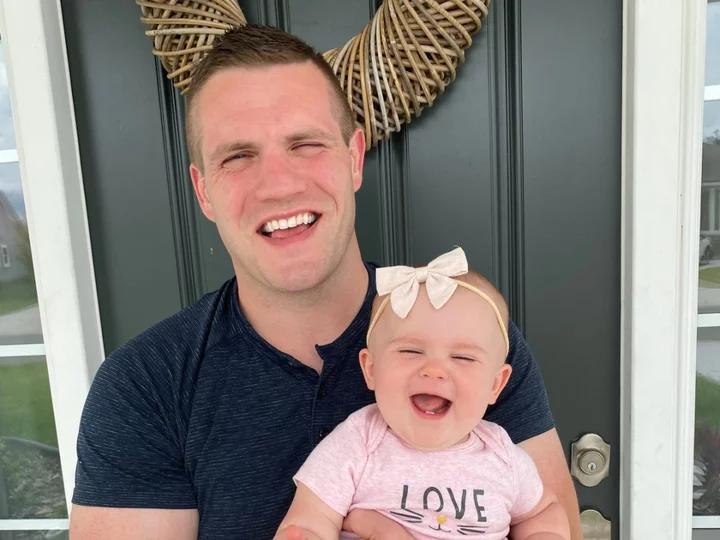
Jared Bridegan murder: Ex-wife Shanna Gardner appears in court as DeSantis signs extradition order
Shanna Gardner, the ex-wife accused of orchestrating the death of Microsoft executive Jared Bridegan, appeared in a Washington court on Thursday to dispute her extradition to Florida. Ms Gardner appeared in Benton County Superior Court after Florida governor Ron DeSantis signed an extradition order, the Jacksonville State Attorney’s Office told News4Jax. The extradition hearing was an attempt by Ms Gardner’s attorneys to prevent her extradition to Duval County where she faces charges of first-degree murder, solicitation to commit first-degree murder, conspiracy to commit first-degree murder and child abuse. The ex-wife of Bridegan is accused of hatching a murder-for-hire plot with her second husband, Mario Fernandez, to kill Bridegan by hiring Henry Tenon to shoot him. Bridegan was dropping off his two children at Ms Gardner’s home in Jacksonville Beach when he was ambushed and fatally shot. One of his other children was in the car at the time. Ms Gardner, who resides in Washington state, was arrested on 17 August – more than a year after Bridegan was killed. The Independent has reached out to Jacksonville State Attorney for comment. Read More Ex-wife charged with murder of Microsoft executive Jared Bridegan Microsoft exec Jared Bridegan was shot dead in a chilling ambush. Did his ex wife arrange it?
2023-09-15 20:47

Special counsel says there’s ‘no valid basis’ for DC judge in Trump’s Jan 6 case to recuse herself
The office of Special Counsel Jack Smith has argued in a motion that there’s “no valid basis” for Judge Tanya Chutkan to recuse herself after Donald Trump’s legal team argued that she should leave the case because of statements she made when sentencing January 6 rioters. “There is no valid basis, under the relevant law and facts, for the Honorable Tanya S. Chutkan, United States District Judge for the District of Columbia, to disqualify herself in this proceeding,” the special counsel’s office wrote in a 20-page filing on Thursday. “In service of his motion (ECF No. 50) seeking the Court’s recusal, the defendant both takes out of context the Court’s words from prior judicial proceedings and misstates the proper legal standards governing judicial recusals.” The special counsel added that Mr Trump “has failed to identify anything approaching the clear and convincing evidence necessary to overcome the presumption of impartiality”. The office argued that Mr Trump was using “suggestion and innuendo to insinuate something sinister in the Court simply doing its job by addressing sentencing arguments”. More follows...
2023-09-15 20:45

'Bling Ring' suspect convicted in multimillion dollar burglaries of celebrities' homes
A Southern California man has been convicted on three counts related to the "Bling Ring," a group that burglarized the homes of celebrities in 2018, the Los Angeles County District Attorney's Office said in a statement.
2023-09-15 19:24

16th Street Baptist Church bombing: Honoring the 4 little girls killed 60 years after KKK attack
On the morning of September 15, 1963, Rev. John H. Cross Jr. and members of the 16th Street Baptist Church
2023-09-15 18:17

Busted working on new album and vow they are here to stay
Busted are enjoying "exploring" new "essences" to their sound on their next album.
2023-09-15 17:29
